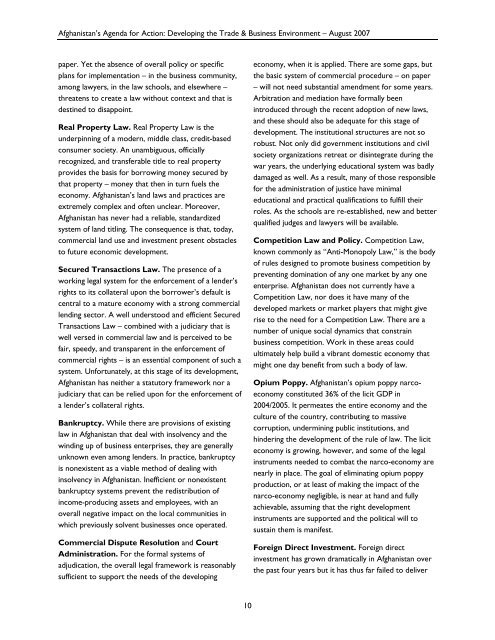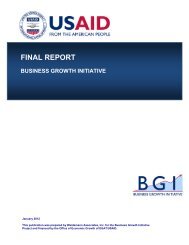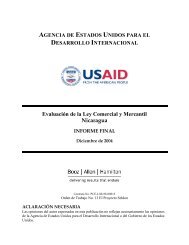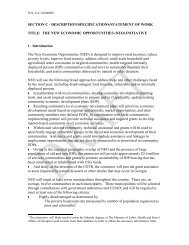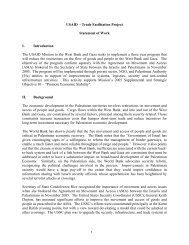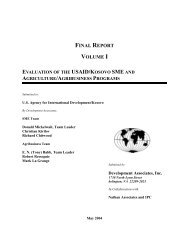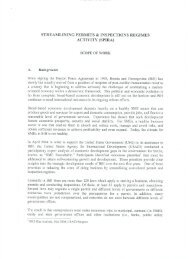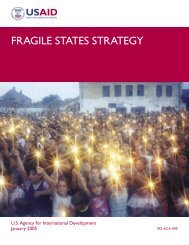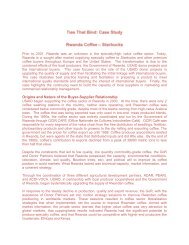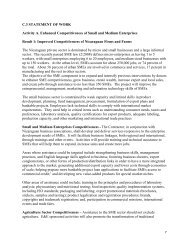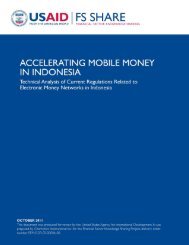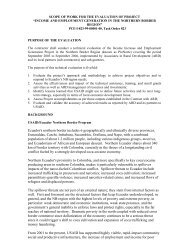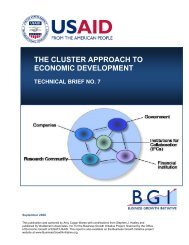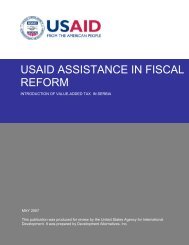Afghanistan's Agenda for Action - Economic Growth - usaid
Afghanistan's Agenda for Action - Economic Growth - usaid
Afghanistan's Agenda for Action - Economic Growth - usaid
Create successful ePaper yourself
Turn your PDF publications into a flip-book with our unique Google optimized e-Paper software.
Afghanistan’s <strong>Agenda</strong> <strong>for</strong> <strong>Action</strong>: Developing the Trade & Business Environment – August 2007paper. Yet the absence of overall policy or specificplans <strong>for</strong> implementation – in the business community,among lawyers, in the law schools, and elsewhere –threatens to create a law without context and that isdestined to disappoint.Real Property Law. Real Property Law is theunderpinning of a modern, middle class, credit-basedconsumer society. An unambiguous, officiallyrecognized, and transferable title to real propertyprovides the basis <strong>for</strong> borrowing money secured bythat property – money that then in turn fuels theeconomy. Afghanistan’s land laws and practices areextremely complex and often unclear. Moreover,Afghanistan has never had a reliable, standardizedsystem of land titling. The consequence is that, today,commercial land use and investment present obstaclesto future economic development.Secured Transactions Law. The presence of aworking legal system <strong>for</strong> the en<strong>for</strong>cement of a lender’srights to its collateral upon the borrower’s default iscentral to a mature economy with a strong commerciallending sector. A well understood and efficient SecuredTransactions Law – combined with a judiciary that iswell versed in commercial law and is perceived to befair, speedy, and transparent in the en<strong>for</strong>cement ofcommercial rights – is an essential component of such asystem. Un<strong>for</strong>tunately, at this stage of its development,Afghanistan has neither a statutory framework nor ajudiciary that can be relied upon <strong>for</strong> the en<strong>for</strong>cement ofa lender’s collateral rights.Bankruptcy. While there are provisions of existinglaw in Afghanistan that deal with insolvency and thewinding up of business enterprises, they are generallyunknown even among lenders. In practice, bankruptcyis nonexistent as a viable method of dealing withinsolvency in Afghanistan. Inefficient or nonexistentbankruptcy systems prevent the redistribution ofincome-producing assets and employees, with anoverall negative impact on the local communities inwhich previously solvent businesses once operated.Commercial Dispute Resolution and CourtAdministration. For the <strong>for</strong>mal systems ofadjudication, the overall legal framework is reasonablysufficient to support the needs of the developingeconomy, when it is applied. There are some gaps, butthe basic system of commercial procedure – on paper– will not need substantial amendment <strong>for</strong> some years.Arbitration and mediation have <strong>for</strong>mally beenintroduced through the recent adoption of new laws,and these should also be adequate <strong>for</strong> this stage ofdevelopment. The institutional structures are not sorobust. Not only did government institutions and civilsociety organizations retreat or disintegrate during thewar years, the underlying educational system was badlydamaged as well. As a result, many of those responsible<strong>for</strong> the administration of justice have minimaleducational and practical qualifications to fulfill theirroles. As the schools are re-established, new and betterqualified judges and lawyers will be available.Competition Law and Policy. Competition Law,known commonly as “Anti-Monopoly Law,” is the bodyof rules designed to promote business competition bypreventing domination of any one market by any oneenterprise. Afghanistan does not currently have aCompetition Law, nor does it have many of thedeveloped markets or market players that might giverise to the need <strong>for</strong> a Competition Law. There are anumber of unique social dynamics that constrainbusiness competition. Work in these areas couldultimately help build a vibrant domestic economy thatmight one day benefit from such a body of law.Opium Poppy. Afghanistan’s opium poppy narcoeconomyconstituted 36% of the licit GDP in2004/2005. It permeates the entire economy and theculture of the country, contributing to massivecorruption, undermining public institutions, andhindering the development of the rule of law. The liciteconomy is growing, however, and some of the legalinstruments needed to combat the narco-economy arenearly in place. The goal of eliminating opium poppyproduction, or at least of making the impact of thenarco-economy negligible, is near at hand and fullyachievable, assuming that the right developmentinstruments are supported and the political will tosustain them is manifest.Foreign Direct Investment. Foreign directinvestment has grown dramatically in Afghanistan overthe past four years but it has thus far failed to deliver10


